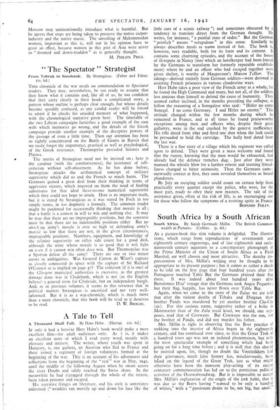A Tale to Tell
A Thousand Shall Fan. By Hans Habe. (Harrap. los. 6d.)
IF only it had a heroine Herr Habe's book would make a most excellent film—for adult audiences only. As :t is, it makes an excellent story of which I read every word, mainly with pleasure and interest. The writer, whose youth was spent in Hungary, is, one gathers, an Austrian who fled to France and there joined a regiment of foreign volunteers formed at the beginning of the war. This is an account of his adventures and reflections from the beginning of the " real " war in May, 1940, until the middle of the following August when he swam across the river Doubs and safely reached the Swiss shore. In the meanwhile he had zigzagged through the whole of the retreat, been taken prisoner and escaped.
His narrative fringes on literature, and his style is sometimes enlivened (" wrinkles ran merrily up and down his face like the little cars of a scenic railway ") and sometimes obscured by a tendency to translate direct from the German thought. He writes, for instance, "a painful state of order." But the German " peinlich " means " scrupulous " in this sense. Similarly he always describes meals as warm instead of hot. The book is, however, very readable, both for its form and its content. It contains some charming episodes, and the account of the house of ill-repute in Nancy (into which an hotelkeeper had been forced by the Germans to transform her formerly reputable establish- ment) where he and an officer who had escaped together were given shelter, is worthy of Maupassant's Maison Tether. The takings—derived entirely from German soldiers—were devoted to assisting French prisoners in various clandestine ways.
Herr Habe takes a poor view of the French army as a whole, for he found the High Command and many, but not all, of the soldiers less anxious than himself to defend the cause of humanity. They seemed rather inclined, in the months preceding the collapse, to follow the reasoning of a Senegalese who said : "Hitler no come Senegal. I no come Germany. I and Hitler no enemy." This attitude changed within the few months during which he remained in France, and at all times he found praiseworthy exceptions among men and officers who, despite their great gallantry, were in the end crushed by the general inefficiency. His rifle dated from 1891 and fired one shot when the lock could be persuaded to hold the cartridge. The bully beef dated from the last war.
There is a fine story of a village which his regiment was called upon to defend. They were given a mass welcome and found that the mayor, knowing that the men would be exhausted, had already had the defence trenches dug— Just after they were manned the whistle blew for a further retreat and trusting friend- liness changed to bitter animosity. Then the Germans mine: outwardly correct at first, they soon revealed themselves as brutal plunderers.
By July an escaping soldier could count on certain help from practically every quarter except the police, who were, for the most part, ready to obey their new masters. The tale of the assistance given, often at the risk of life, is an encouraging one for those who follow the symptoms of a reviving spirit in France.
BERNARD FOLEY.


























 Previous page
Previous page